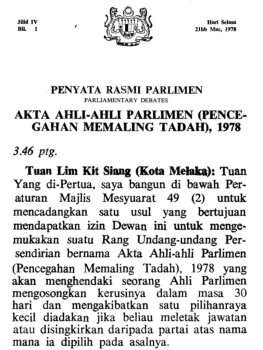On 7 September, the Johor State Legislative Assembly hastily passed a Bill which amended the state’s Laws of the Constitution of 1895 in its third reading, triggering serious concerns about the conduct of fair elections in the state.
The amendment has substituted a new condition for “by-election” within Part II Article 23 Clause (5) of the constitution. The latest provision stipulated that “a casual vacancy shall be filled within 60 days from the date on which it is established by the Election Commission (EC) that is a vacancy”.
In other words, the EC, and not the Speaker of the House, will determine the date of the vacancy and call for by-election within 60 days from a date set by the agency.
According to the previous clause, it is the legislative assembly which decides if there is any vacancy and when it is should be filled; normally, within 60 days for a by-election. The assembly’s Speaker, therefore, is the one to hold and execute such powers without interferences from any agencies, including the federal ones. It is the EC, a federal institution, to receive the former’s order and not vice versa.
What are the consequences?
The consequences are many. The EC, a body appointed by the federal government, has become more powerful than the legislative body and the Speaker, which are directly elected by the rakyat. Clearly, this is an infringement against the democratic process in the state.
For example, let’s assume that Pakatan Rakyat has formed a simple majority government in Johor with just two seats more than the Barisan Nasional (BN). If two state assemblymen were to resign, then the EC will decide on whether there should be a by-election or not. Should the commission opt not to hold a by-election, then both tPR and BN will possess equal number of seats in the state legislative assembly, resulting in a deadlock. This will be grounds for a state election.
Take another scenario. If two PR assemblymen hop over to BN, we will see a change in state government as in the Perak case. What the amendment in the Johor constitution does is that it gives EC the power to make a ruling which will invariably benefit the federal government, such as declaring that no by-election will be held for the seats. This subsequently encourages party-hopping in the state, which again, to the people, is a betrayal of their sacred votes.
Comparison to the Federal Constitution
State assemblyman for Skudai, Dr. Boo Cheng Hau, said that the amendment in the Johor Constitution was fundamentally different from what happens at the federal Constitution level.
“In Parliament, any vacancy in the Dewan Negara is resolved by the president of the upper house while in the Dewan Rakyat, it is the EC. Although the freedom of the lower house will be compromised, the end result is still the formation of the federal government facilitated by the federal agency, EC. After that, it functions under the newly formed federal administration, and there is not much friction between the two,” said the DAP Johor chairman.
The state’s Opposition Leader also revealed that to date, Sarawak was the only state to have amended this particular clause in its constitution, back in 1988.
BN preparing for next election?
In response to the bill being passed without room for discussion, Dr. Boo complained, “I was frustrated that my debate speech on the bill (on 8 September) was halted half way for the reason that I did not protest on its first reading. But Standing Orders clearly state that the first reading could not be debated or interrupted. Any debate can only be proposed at the second reading.”
It is obvious to all that this detrimental move is a reaction to the results of the March 2008 general election. BN is looking at the possibility of defeat in the coming general election and should they lose power by a simple majority, they will have the upper hand to mobilize the EC, a federal agency, to legitimize a power grab — as demonstrated in the Perak ‘model’ and the current ongoing attacks on the Selangor government.
The partnership between BN federal and state governments which involves using the EC as a political tool to topple PR-led state governments, is unethical and immoral conspiracy to hold on to power against the will and desire of Malaysians.
This amendment to the Johor constitution is likely to up a Pandora’s Box of unrestrained money politics in the state as well as in the whole country. It is possible that more democratically-elected PR state governments held will fall as a result of crossovers by state assemblyperson who are either ‘bought’ or ‘blackmailed’ into hopping over to BN.-The Rocket



